Wherein I self-critique
by javabeans
I like seeing how other people translate, for a few reasons. For one, it helps me improve my own translations, seeing how others express a phrase, plus I’m curious at how I’d do things differently. Lily over at the now-defunct jlandsubs.com used to write posts analyzing her translations, comparing hers to other translations of the same thing, and I found them endlessly fascinating. Looking back at all the things I’ve worked on, I figured I’d give it a try as well.
(Unfortunately, it was easier for Lily because j-dramas often are subbed by multiple groups, while kdramas aren’t, so I don’t have much to compare against. If I analyze translations in the future, I’m thinking of comparing some of my summary work with translations other people have done, unless there are objections — I absolutely don’t mean to put the other work down; I only want something to compare with, to illustrate my point. If anyone doesn’t like the idea, let me know and I’ll reconsider. So for this post, I’m just going to pick at my own past translations — what I liked, what I didn’t like, what I’d do differently now.)
So. That’s why I’ve been skimming through some GOONG episodes, now that it’s airing on cable channel IATV (Imaginasian), and I have to say the series has got one of the better subtitles I’ve seen. (I didn’t work on Goong, although I have already seen the series prior to this.) In contrast, I really disliked the translations of Que Sera Sera that I saw on television. And although AZN’s version of Fantasy Couple was fine, they drove me nuts with their abuse… of ellipses… at the end… and beginning… of every… single… sentence…
Generally, subs for televised kdramas are decent, but I’m annoyingly picky so I tend to find fault with many of them. I know I should be more open-minded, because I’m sure I totally make mistakes too, but I can’t help but cringe when I see something badly worded or off-the-mark. I find that the difficulty with subbing isn’t the Korean part; it’s the English part. If your translator is completely fluent in Korean but isn’t able to convey their intent clearly to an English speaker, their excellent Korean skills have gone to waste.
What is good about the IATV version of Goong’s subtitles is, on top of merely conveying meaning, the translation attempts to get across a lot more nuance and subtext in its word choice. Goong is particularly difficult because the drama actually utilizes the language to emphasize story points, and covers a wide range of the Korean-language spectrum.
First, it has normal, everyday Korean speech. Contrasting with the “regular” talk, it also uses formal palace terminology, mixed in with antiquated Korean, and sometimes even poetic, ancient Chinese (translated into Korean) terms. On top of that, the younger characters use a lot of slang, more than you’ll find in normal kdramas. If translated straight, the non-Korean-speaking viewer isn’t made aware of these differences.
For instance, Yul has recently returned to Korea after spending most of his life in England, and is therefore unfamiliar with a lot of slang Korean, which Chae Kyung ends up explaining to him. In order to make his confusion apparent, the English translation needs to use similarly strange or slangy terms to show that they’re unusual word choices.
In one episode, Chae Kyung suggests to her classmates to speak normally with Yul even if he’s a prince. She says they should all act like friends, which was translated to “keep it real.” The translation isn’t literal, and it’s a little out of vogue (it’s not really hip American vernacular), but it’s a good choice because Yul misinterprets the phrase (it can literally mean “eat a friend”).
In the episode that’s airing now, her friends mumble about “gobbledegook” — and again, that isn’t the literal translation, or all that elegant-sounding in English, but the point is that it’s a word Yul doesn’t understand. (Imagine if the line were translated directly — “Sounds like a foreign language to me!” — and Yul didn’t understand what that meant. He’d seem dumb.)
I also try to avoid words like “wanna” and “gonna” unless it really fits the scene, but it works in Goong, which uses colloquial wording to differentiate Chae Kyung’s commonness from the strictures of palace life. The IATV translation is a little loose (I don’t love that they have Chae Kyung using “freakin” constantly in the palace, because I think the word expresses stronger connotations than is intended — Chae Kyung is being slangy, but not disrespectful, and “freakin” is pretty disrespectful when spoken to royalty), but overall, it gets the tone across very well.
I’m looking forward to how THE STORY OF HYANG DAN will be translated, because there’s a similar mix of ancient and modern. A lot of the funny comes from the mixing of the two — the characters glide smoothly from one to the other without batting an eyelash, which makes it cheeky and fun.
GOONG S has similar challenges, because of the mix of formal and antiquated Korean with the modern. Goong S is a series I spent some time working on, so I can speak directly to its translation frustrations.
For the same reason that I’m watching Goong now, I tried catching a few episodes of Goong S when it aired on LA18, just to see how it was done. My personal bias may be showing, because I don’t love LA18’s translations, but that could be leftover annoyance at how the station chops up the drama and discards about a quarter to a third of the contents to fit it in its programming schedule (which is bloated with an irritating excess of commercials anyway. That’s why I avoid LA18. I understand the need to edit for time, but the resulting hack work can be pretty atrocious. It’s worse when the shows in question are as subtle and dependent on small moments as Que Sera Sera and Flowers For My Life — cutting huge chunks out of the show results in horribly awkward, confusing episodes.)
But anyway.
Looking back at Goong S, there are a few things I’m still dissatisfied with… For instance, the palace terminology was something we had to come up with that would be both accurate and easily understandable. The difficulty is that these words are derived from terms used in bygone Korean times, but aren’t in use anymore — but since the series takes place in the present, certain things require updating. I disliked some of LA18’s choices — for instance, they called the Queen’s secretary/attendant “chamberlain.” I’m not totally satisfied with “aide” or “attendant,” which is what we used, but chamberlain sounds so… stuffy. And British. (Redundant? I kid, I kid!)
Then, there were the female palace servants, which we translated as “palace maid.” If I could go back, I wish I could’ve picked a better word — and yet, I still can’t think of one I’d prefer. I think the subs on TV may have used “court lady” or something of that sort, which isn’t wrong — but I remember specifically not choosing “lady” because that connoted a higher status than they actually had. But conversely, “palace maid” makes them seem lower than they are. It’s a respectable position — they’re not merely there to clean — and yet, it’s not like they’re nobility either.
Soon Yi (pictured) may be in a dignified position for a commoner, but she’s distinctively lower in status than Sae Ryung (Park Shin Hye), who’s the equivalent of nobility. Prince Hoo can marry Sae Ryung; it’s out of the question for him to consider marrying Soon Yi.
As for the royalty, we chose to stick with the Korean words, like “Young Sung Gong” to refer to Prince Hoo (Seven), “Pye-ha” to represent the queen (Myung Se Bin), “Hwang Tae-hu” to represent the older queen… The TV subs translated those terms to their Western counterparts, referring to Joon’s father, the Hyo-jang Dae-gong, as “Grand Archduke” or something of that sort. When we worked on the series, we didn’t go that route because I felt that although Hyo-Jang Dae-gong is an unwieldy term, calling him a duke or archduke applied a certain Westernness to the monarchy that Goong S doesn’t actually carry. I was a little looser with the terms prince and queen, because those words are more recognizable and less “borrowed.” If I could go back, I might prefer to convert “Mama” to “highness”… although I’m torn on that one.
Then, there’s COFFEE PRINCE STORE #1, which was really interesting because I had the chance to go back after translating my portion of the Special Episode, after it was timed, to then edit what I’d originally translated. I know fansubs aren’t held to a professional standard, and they’re more often driven by speed than perfection, but ideally, it would be wonderful if every translator could go back to edit their own subs after they’ve been timed to the video.
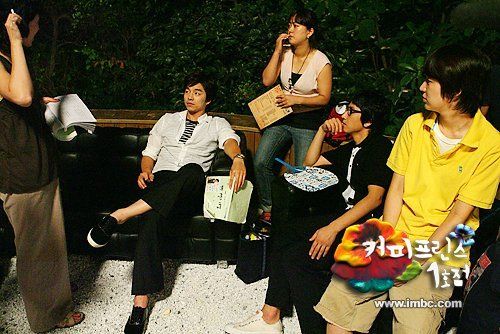
You might translate a line faithfully, and then see it flash onscreen in a jumble of unreadable words and realize that the average viewer can’t get all that info in the brief two seconds the words display onscreen. That’s when I’d go back and cut all those unnecessary words to streamline the dialogue — because as much as I want something to be as close to the complete meaning as possible, the sub has to be usable.
For instance, in the first round, I’d translated this long sentence about the set design thusly:
(1) “The key point, more than renovating it magnificently into something new,”
“but as explained in the script, was that”
“the Princes used their own strength and efforts to make it themselves.”
“We tried hard to express that intent.”
After reading that onscreen, I realized it was way too complicated and confusing. Plus, by the time you got to the end of the sentence, it was possible you’d lose track of the sentence and forget what the point was. So I went back and changed it to:
(2) “The key point was,”
“more than renovating it magnificently into something new,”
“but as the script explains,”
“the Princes used their own strength and efforts to make it themselves.”
Not much difference, but I like to think the second version was cleaner and therefore easier to read.
There’s also a tendency in subtitles to stick too closely to what is said exactly. (For instance, a lot of times, the “um”s and “ah”s are left in — and my philosophy is, the non-Korean-speaker understands “um” and “ah.” No need for screen clutter.) The same goes for word repetition. Again, in the Coffee Prince special, the art director talks about Han Gyul’s apartment, and I’d translated it:
“The rooftop, or you could call it a penthouse.”
“Isn’t it the kind of place youngsters have a desire to live in?”
(1) “Wanting to live at the very top, closest to the sky,”
“living in the highest place, a spacious place.”
I didn’t like that on the second pass, and cut the last two lines to:
(2) “Wanting to live at the very top,”
“closest to the sky, in a spacious place.”
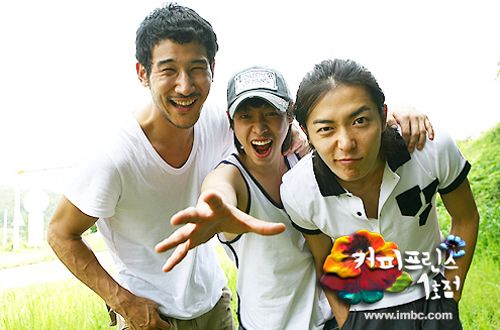
I’ve learned by now that a strict literal translation isn’t always best. For instance, this line in the Special
(1) “As the place where Han Sung and his longtime girlfriend Yu Ju met and broke up,”
“this house is also the place where their love recovered.”
is really the more accurate, literal translation. And if it had been short enough to display in one line, it could have been fine to use as is. But because the sentence is too long and needs to be broken into two lines, I chose to go for a slightly-less-literal phrasing:
(2) “This is where Han Sung and his longtime girlfriend Yoo Ju met and broke up.”
“It’s also the place where their love recovered.”
Not much difference in meaning, but easier to follow, ja? The same guideline applied for the following line, because I found my original translation confusing and long:
(1) “The Coffee Prince cafe, an essential location in the drama,”
“the setting for Han Gyul and Eun Chan’s sweet love story,”
“was really an oven whose intense heat they had to fight against.”
If you’re going by sentence syntax and structure, the above is what he’s really saying. But that got simplified to:
(2) “The Coffee Prince cafe was an essential location in the drama.”
“This setting for Han Kyul and Eun Chan’s sweet love story”
“was really an oven whose intense heat they had to battle.”
I think the second is smoother and much more readable. And less likely to give the watcher a headache trying to follow the point of the sentence.
Ah, I had more to say, but this is longer than I intended, so I’ll end this here. I wonder if this is interesting for anyone — I know most of it is extreme nit-picking, but there have got to be language-lovers out there who dig, yeah?
RELATED POSTS
Tags: Coffee Prince, fansubbing, Goong, Goong S

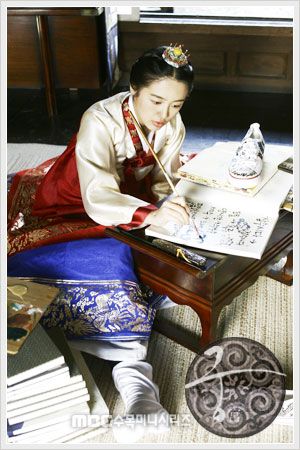
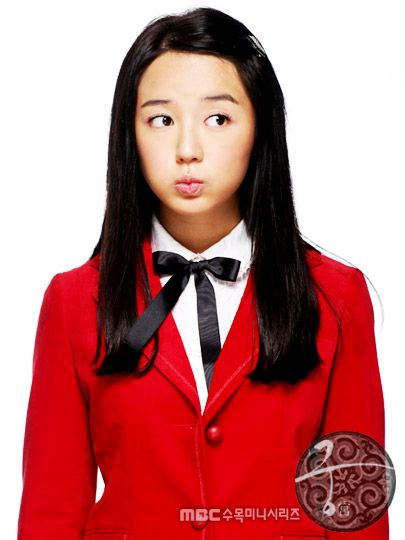
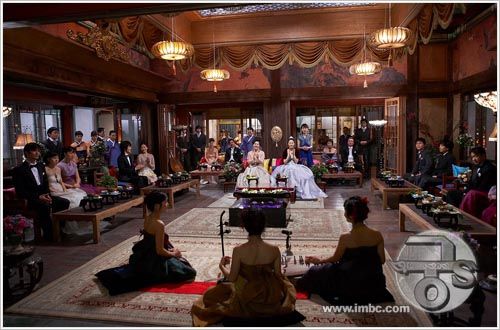
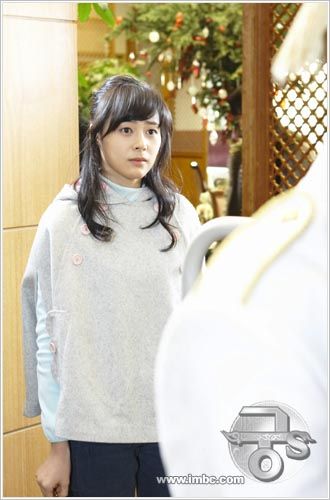
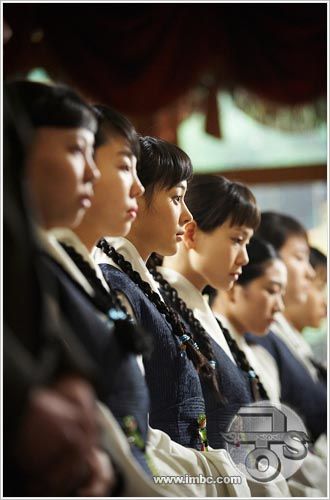

 Interview with Kim Yoo-jung
Interview with Kim Yoo-jung Hello Dramabeans series
Hello Dramabeans series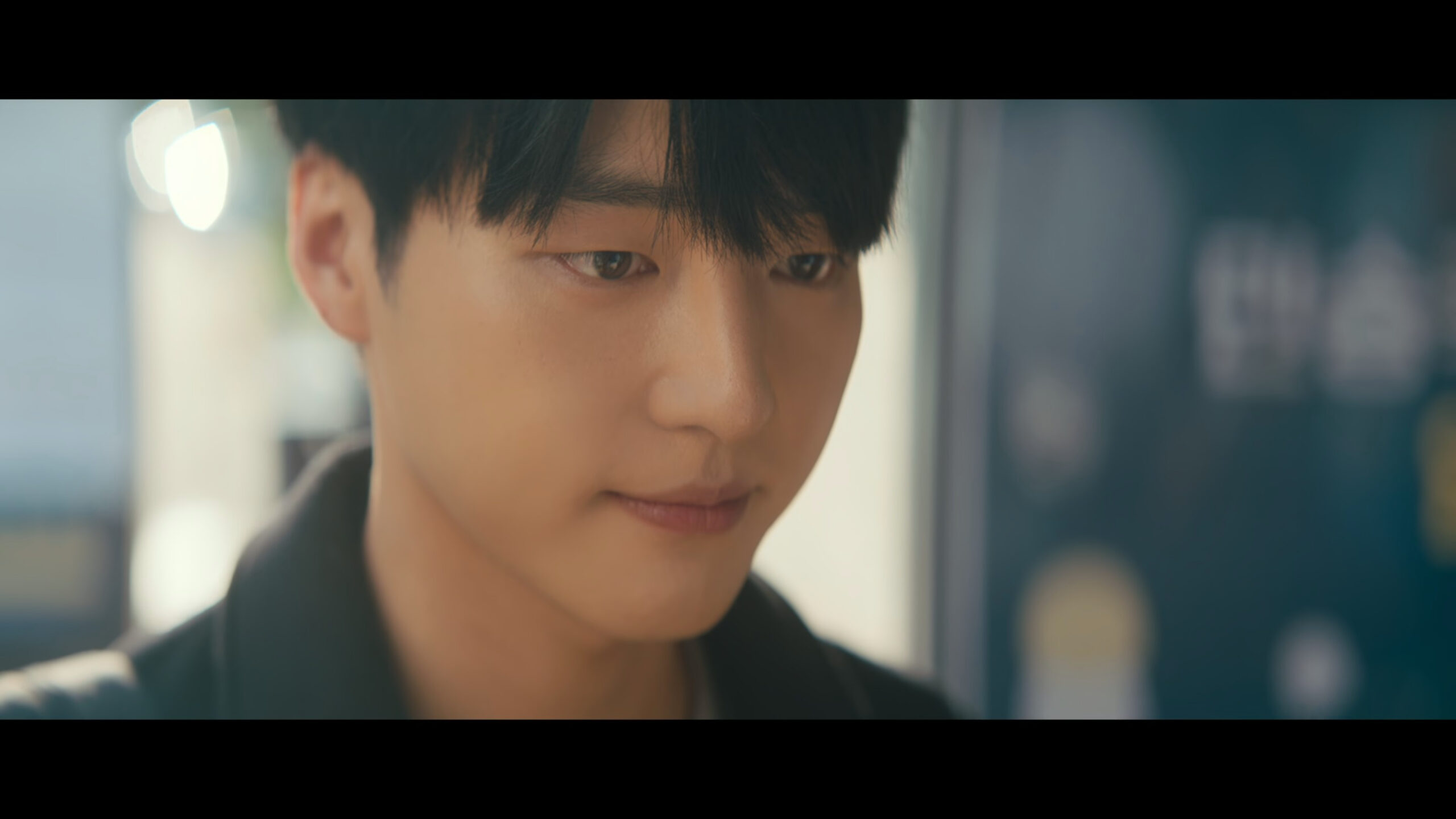
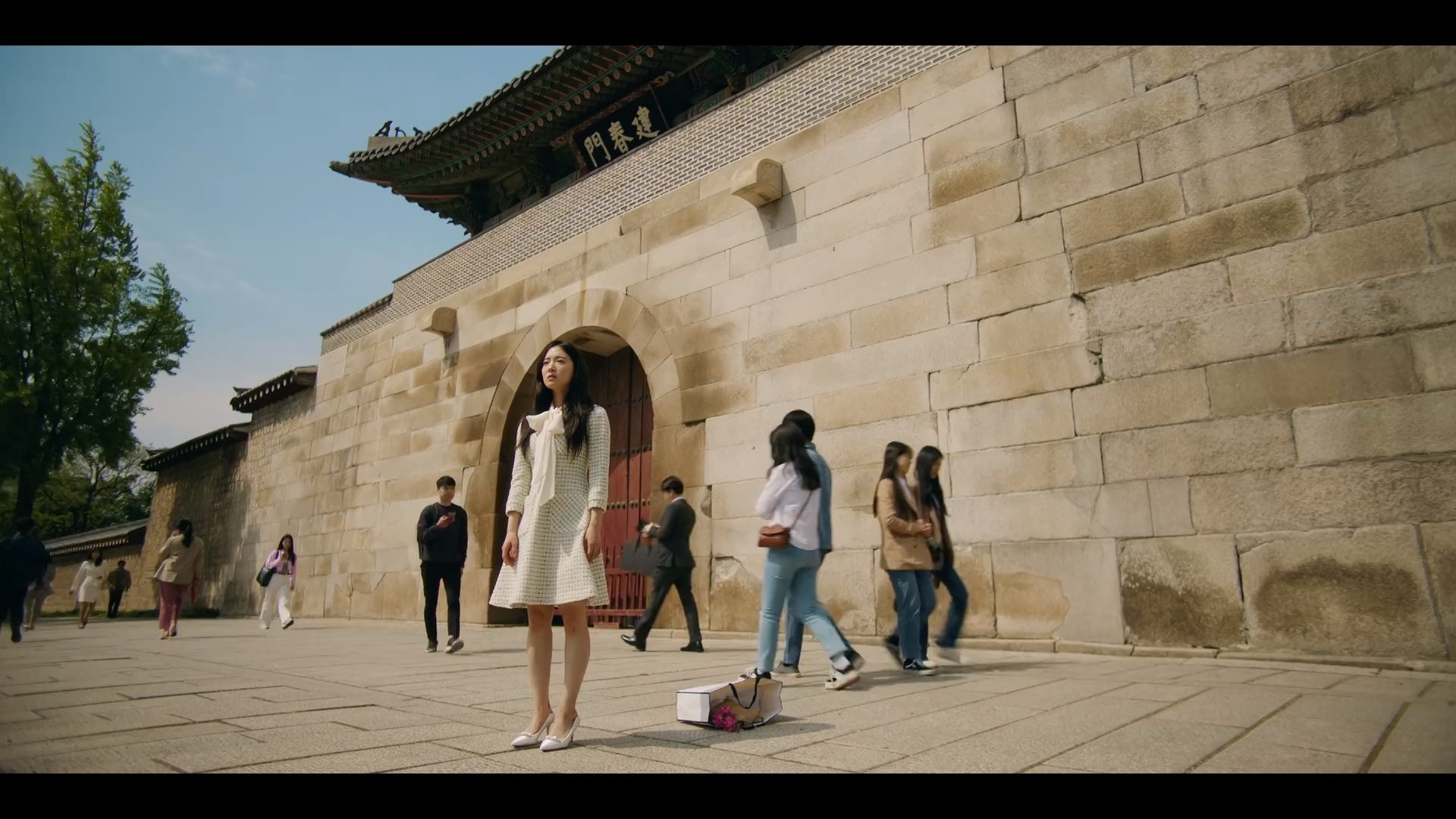


![[2022 Year in Review] The Bean Count](https://www.dramabeans.com/wp-content/uploads/2022/11/beancount_2022.png)

Required fields are marked *
Your email address will not be published. Required fields are marked *
1 heyleadinglady
September 11, 2007 at 7:52 PM
personally, i'm very fascinated and attracted to this topic, definitely :) i'm not korean, and i can't speak the language or understand it without the english subtitles, or not much anyway, but i'm planning to study korean in the future but i just dont know where to start :D korean lessons for me then?
good job dramabeans, as always.
(oh and analyzing other people's summary works are completely fine to me, but i doubt other people (or the people themselves probably) will take it as lightly if they see you're judging theirs. so maybe you should think more about that :))
Required fields are marked *
2 Jessica
September 11, 2007 at 8:18 PM
Re: “freakin”
How funny would it be if they made her a Valley Girl and used "hella"
Required fields are marked *
3 Jessica
September 11, 2007 at 8:26 PM
Oh, and let me add that I find these types of articles fascinating. I always wonder how what the thought process is behind subbers because not only are you translating the language, but you're also interpreting the entire culture as well.
I remember this quote from Justice Brandeis, "There is no great writing, only great rewriting."
Required fields are marked *
4 thistle
September 11, 2007 at 8:49 PM
Linguistic musings are always interesting! Thanks so much for your work.
The WITH S2 .srt file I downloaded for the CP special has a timing issue, actually. We're good through the twenty-minute mark, and then lines occur in out-of-order chunks; I recognized some from the episode flashbacks, so I could see what was going on, but I had to stop. Will there be a re-release? Did I just get a corrupt file by happenstance?
Required fields are marked *
5 einah08
September 11, 2007 at 8:50 PM
it is interesting javabeans! again, we were really thankful to all the subbers hardwork.. we too get to enjoy the all this k-series!
Required fields are marked *
6 thistle
September 11, 2007 at 8:51 PM
oops--forgot to say I have the Ental version.
Required fields are marked *
7 lalalovee
September 11, 2007 at 8:58 PM
hey! it's good to know that someone really puts so much time and consideration into making sure the subs are good. Thanks a lot!
wah~ i can't believe I actually read all of that @_@
Required fields are marked *
8 trihok
September 11, 2007 at 8:59 PM
jus wanna say...thank you for all ur hard work ;)
Required fields are marked *
9 Javabeans
September 11, 2007 at 9:23 PM
Heh, I've always thought hella was a NorCal thing.
thistle, I have the ental version of the subs, and they work fine for me. I haven't heard of people having problems -- could you try redownloading the sub file and see if perhaps it was just a one-time glitch when you downloaded?
lalalovee, i can't believe I actually wrote all that. (Well, okay, I can. I'm a wordy one.)
Required fields are marked *
10 PixieJewel
September 11, 2007 at 9:24 PM
I understand hiw you feel, Javabean. I have bought some dvd here locally and their sub suck. I am not complaining just the grammar but the whole literal translation makes the whole sentence different from what it intended to mean. Thankfully after 2 years of obsessing with kdrama, I have pickup some simple word that gets me by if I had to watch it raw, though I am still far frombeing able to understand fully between the regular speech and formal speech. I wanted to learn the language but it cost a bomb here. Any idea where I could download to learn the language?
Required fields are marked *
11 gailt
September 11, 2007 at 9:28 PM
"language-lovers... who dig"
there's a "yeah" over here.
i find this extremely interesting. i had seen the special, and noticed that you were both the co-translator and QCer. at that time, i thought of my assumption that subbers on a certain episode do not take dual roles. so it's really nice to hear your thoughts on taking on those two roles. :)
as someone who does not speak/understand the original language and relies on english subs, i have these thoughts to share.
i enjoy seeing Korean words in the subtitles. In Goong, seeing the word "Mama" does not confuse me because it's easy to tell that we can approximate it as "highness" from the context. they could even be a tool to learn some Korean words along the way. :)
i found that i can overlook bad english subtitles very easily. misspellings may sometimes trip me up, and grammar may not be perfect but that is not such a big deal for me (and i'm a grammar geek). what drives me nuts is an empty screen when my actors are still speaking. is that a matter of timing? is that a matter of lost translation? is that a matter of redundancy in the dialogue? i would never know because the screen remains blank.
i'd rather have paraphrased short sentences than word-for-word translations when viewing the subbed dramas. you are right in saying that the viewer can easily forget the first part of a long-winded sentence cut up in several lines.
so in the Coffee Prince special comparisons that you gave above, i really prefer the second choice. the differences are subtle but they can mean a lightbulb flash in the viewer's mind. seeing the side-by-side comparisons, my opinion is that the second choices were tighter and more succinct.
i really appreciate the hard work done by the entire subbing team. i, too, am eagerly looking forward to the Hyang Dan english subs. i wonder what choices the team is going to make.
thanks javabeans.
Required fields are marked *
12 Paloma3001
September 11, 2007 at 9:30 PM
What interesting article about translating k-dramas!!
This is a great lesson, especially for me. I´m a Spanish speaker and recently I helped to a friend to translate into spanish two episodes of Que sera sera, and sometimes it was very hard to do it properly, decently. and understandable. I kept with the feeling that, words and emotions in korean language were strongest than the words in spanish.
Thanks Javabeans for letting me understand this side of kdramas. I was wondering if the new drama "TWSSG" could be difficult to understand, since it was placed into an ancient times, and perhaps its language and korean historical references could be hard to follow-up.
Required fields are marked *
13 Jeanette
September 11, 2007 at 9:48 PM
yea, i see what you're saying about the la18 subs. i may not be a korean speaker but watching enough dramas i sometimes dont need translations...like 25% of the time. i hate when i see these errors...ugh! especially as you mentioned, the word choices. sometimes they cause the character to lose its validity by making them seem generic. the wording comes off to literal while the words should have been more subtle. things like that. well, i mostly dowload the subs but in l.a. we only have la18 and channel 19 giving dramas with subs. la18 right now is giving subs for coffee prince and times of wolf and dog. channel 19 is giving subs for capital scandal and 9ends 2outs. i prefer channel 19 but i love coffee prince so whenever i can see it again, i go for it!!
Required fields are marked *
14 thunderbolt
September 11, 2007 at 9:48 PM
Ah, I love this entry, sarahbeans. A fellow WITH S2 member and I have been talking about translation recently and I enjoy being able to discuss word choice, meaning, etc. with her as we work on some episodes together. Would 'preliminary meeting' convey the meaning better than 'first meeting'? Shouldn't it be 'restroom' instead of 'washroom'? Like you, I find such 'nitpicking' endlessly fascinating, LOL.
I agree that it's important to streamline the dialogue. If the line is detailed but the reader can't read it fast enough, then we just have to cut it for a neater fit. Take this 2-part line:
"This is purified Balloon. Just as
the potency of the drug increased,"
"it would only be natural that the price jumps."
I like how clear and detailed the line is and how it explains the situation perfectly. But when I was reading it, it was too long for the 4-second timing. So very reluctantly I had to cut the line and join the timing into one:
"This is purified Balloon with increased potency,
so it's only natural that the price jumps."
I still like the original better (it sounded more lyrical too) but oh well... (excuse the ellipsis, sarah!^^)
If only we have more time to mull over tone, nuances, connotations and so on. And to edit and re-edit without having to rush because hundreds and thousands of people are waiting for the subs. Last night I was rewatching an episode of Time of Dog and Wolf that I had edited a few weeks back. And yeeks, I saw several (small) inconsistencies that I had overlooked. I don't think anyone else would have cared two hoots but it still bothered me. After a few seconds of "EGAD! How did I miss that?!" I decided it was useless beating myself up over it. I started doing fansubbing in 2003 and even now I'm still learning how to be a better editor. My goal is to be able to look back on an episode and say, "Ah, no mistakes!!" That hasn't happened yet though because there's always something I wished I had done better. Nitpickers unite!
Required fields are marked *
15 mizune
September 11, 2007 at 10:04 PM
I completely agree with you on how your translation style changes over time. I haven't worked on many projects (and all Japanese), but over the past couple years, I've found that my style has changed almost exactly as yours has -- focusing more on the nuances as opposed to completely literal translations. It isn't so much that ppl are lazy reading subtitles, it's that reading too many lines in too short a timing segment is very fatiguing and doesn't necessarily add anything to the reader's comprehension.
Since I tend not to watch Japanese dramas and whatnot with subtitles, I really have to thank fansubbed kdramas (which are extremely thorough, but sometimes need a rewind or two to read everything in the alloted time segment) and commercially subbed kmovies (very simple to follow, but probably missing a lot of the precise detail) for making me first realize that difference and how much it can affect the viewer in the long run. [Just as a disclaimer, I'm not complaining about it. They're just observations I've made to help guide improvements to my own work.]
I've pretty much always worked alone, so I can certainly vouch for the benefit of being able to go back and review/tweak either my translation, the line breaks, or timing for a sequence in order to help readability. It does takes a lot of time, but I think subtitles are most valuable to the reader when they can watch the show without consciously focusing on those 2-3 lines that span the width of the screen flashing by... Actually, that's another thing I think helps readability: keeping as much of the subtitles centered in the middle of the screen as possible. Reading lines that span across the entire width of the screen is fatiguing to the eyes simply because they have to race back and forth the entire span every time a line goes by. However, by breaking the same line into two shorter pieces centered in the middle of the screen, the eyes can rest comfortably in more or less the same position to soak up more of what's actually going on in the show without having to jump constantly all over the place.
Anyhow, enough of my little soapbox rant. :p
Thanks again for providing so much to the non-korean speaking audience out there. :)
Required fields are marked *
16 bethany
September 11, 2007 at 10:41 PM
definitely interesting!
we're grateful recipients of your work and time... =) and to hear that it is both fascinating and rewarding is vveryverrry good.... a win-win situation!
Required fields are marked *
17 Sylvia
September 11, 2007 at 10:52 PM
I can understand what you mean when you said that although literal translations are preferable, it's how fast and how easily it can be understood to the viewers that might be better off when it comes to subs.
I buy my Korean dramas in DVDs over here, and I'm increasingly annoyed by the poor English - if it can even be called English - translations inside these DVDs!
Seriously! It's one thing to have difficulty conveying Korean to English succinctly (which I can understand, because sometimes it's so much more than words can describe), but to have jibberish passed off as English? This I do not kid. Those words that appear on the screen, aren't even English. They're just alphabets placed together in attempts to form words not found in any English dictionary in the entire world.
It's such a relief to come across fansubs and translations - like what you've done - that are definitely more adequate than what these DVDs try to pull off. My only pity is that I didn't come across all these sooner in order to enjoy my K-dramas :(
Aye, I'm ranting. Apologies! Thanks for your hard work! I've always enjoyed reading your translations and will continue to do so!
PS: By any chance will you be translating 태왕사신기 (The Legend)? *hopeful* hahaha
Required fields are marked *
18 merriwether
September 11, 2007 at 11:00 PM
It's good to know I'm not the only pedantic one with English subtitles...
I find myself thinking like you when I watch Chinese shows with English subtitles; I realise a lot of the time I'm taking a too literal approach to translating things.
Hope to see more of these topics concerning fansubbing brought up. It's an interesting topic that doesn't get much discussion from what I've noticed.
Required fields are marked *
19 thistle
September 11, 2007 at 11:07 PM
hmm. In the version I was watching, at 33:48 the actress who plays Han Yoo Ju is talking about that character's style, but the subtitles are describing Choi Han Gyul's style. The blip I saw around the 20-minute mark showed the beach scene: Han Gyul addresses Eun Chan while she sleeps, and the subtitle says, "Just looking from a distance, it may seem like a manhwa" which is clearly commentary; the following scene in the kitchen (forced kiss) has the subtitles for the initial hiring scene with Eun Chan's ID number....
I've no idea.
Solved by grabbing a different .avi file, anyway, which suggests that the original .avi was the problem. Thanks again!
To keep this comment from being almost totally off-topic: I've done some text-only translation but haven't had to worry about eye movement, proportionality, legibility.... It's really interesting to see the comments here (both Javabeans and others' follow-ups).
Required fields are marked *
20 tealeaf
September 11, 2007 at 11:09 PM
Hmmm, love this post… it is nice to hear your (and thunderbolt’s) thoughts. Your works are awesome no matter how much you faulted them. I sincerely applauded your dedication and professionalism. As for jlandsubs.com, I miss Lily but I’m wishing her lots of luck in pursuing her education and career.
Speaking from a viewer’s standpoint, it’s the flow of the translated language that is most important for me. I don't favor verbatim translations since it is quite confusing for a non-Korean to decipher meanings with limited understanding of the Korean cultures. Thus, I find it helpful if the subbers rework the lines and give me the gist of the dialogues as faithfully as it can be done. The context in which the lines were said is as important as their contents. Of course, I do appreciate if important details were retained; but I accept that you have to sacrifice many to accommodate the final product. Although I have to say that I’m not as demanding as you are on yourselves. Often, I’m just hella glad that I have the translated version! I agree that it would be interesting to see the subbed version of Hyang Dan (with all its side references). Personally, I think that the placements of the subtitles, timing, font color/size in addition to the length of the sentences are also critical. Reading the subtitles should be effortless - subtitles should enhance the viewing experience not interfere with it. It is also nice to see break within the translations so that viewers are able to absorb the visual images, cinematography and of course, (good and bad) acting.
I think that in many instances, dramas/movies failed to deliver the true intention or spirit of the scripts. Sometimes, the actors and directors breathed so much life into a stilted work but there are also times where they butchered an otherwise beautiful script into a state beyond recognition. Out of curiosity, do you often (or find it necessary to) refer to the original drama scripts for your translated works? If yes, do the scripts enhance or hinder your work? If you don’t use the scripts, may I ask, why not?
PS: doubt if “hella” is a NoCal thing - I used to live in the Bay Area and we didn’t use that… at least, back then.
Required fields are marked *
21 teokong
September 12, 2007 at 12:51 AM
Interesting reading here. Translation is hard work and I want to convey my appreciation and thanks to Javabeans, Thunderbolts and all you guys out there for doing such beautiful works. To me as long as the subtitles are concisely sent through, I am fine with it. Fighting! everybody.
Required fields are marked *
22 nileey
September 12, 2007 at 4:08 AM
As I don't understand Korean, I just trust fan-subs, irregardless the grammar :)
Required fields are marked *
23 PinoyFan
September 12, 2007 at 6:19 AM
I agree with you that creating subtitles that convey as much as possible the intent of the original language is a bit difficult.
Do you know that, for my own use and my friends whom I've introduced to Coffee Prince, I modified the subtitles for episodes 13 - 17 (without removing the credits to WITHS2) to better fit English the way it's used in the Philippines and to correct some spelling errors? I noticed that my friends tended to understand the point of the dialogue better when I did so.
I'm even thinking of translating the Coffee Prince subtitles into Filipino/Tagalog based on the WITHS2 subtitles, although I know that it will take a pretty long time. I will also need to buy a comprehensive English-Tagalog ditionary, since I have to admit that there are a lot of English words whose Tagalog equivalents either I'm not aware of or I've forgotten already. That's because in our country we use English equivalents if we happen to forget the Tagalog ones.
Required fields are marked *
24 katwoman
September 12, 2007 at 6:35 AM
Interesting subject. For me subs quality makes a big difference in one's enjoyment of a drama. It makes the difference between liking or loving a drama for me.
For example, my first watch of MNKSS was the YesAsia version. I did not realize how lucky I was to catch the YesAsia version until I watched the version that someone had uploaded on Youtube. On the Youtube version, they totally ruined some of the best lines or left out lines altogether. As a non-Korean, I rely on the conversations to help me understand the characters and to empathize. If the subs does not have the right nuances, I would not be able to "get into" the drama.
I've had really bad experiences with some boxsets because of really awful. This is why we now have an extra computer with extra memory and an external harddrive so that we can download the wonderful fansubs from you guys.
I have to admit I'm a bit more excited when I see that the subbing squad is WITHS2 and even more so when I see credits for javabeans and thunderbolt (I'm a JSA!).
Cheers.
Required fields are marked *
25 thunderbolt
September 12, 2007 at 7:44 AM
"Nitpicking is the act of removing nits (the eggs of lice, though in this case specifically head lice) from one's hair. The original way of treating a person for head lice was to remove each nit one at a time from the hair. This was a slow and meticulous process, and new methods that take less time have been developed in more recent times." (wikipedia)
**************
Here's a line from a Time of Dog & Wolf episode:
"Just as suspected, there is a direct
web cast of the production plant."
Looks okay to me. So after finishing all editing and checking, I posted the final srt file and gleefully announced that said episode was ready for release. One of the best moments for a fansubber is when the job is done. Hurray! Later that same evening, I was browsing the newspapers when my eyes chanced on a print ad. One word jumped out at me: "Telecast." I ran to my computer, switched it on, checked to see if the subs were released yet (they weren't, phew!) and quickly changed the line to:
"Just as suspected, there is a direct
webcast of the production plant."
Telecast. Webcast. ONE WORD. NO SPACING IN THE MIDDLE. What kind of editor are you, thunderbolt? *bonk!*
I guess I need therapy ASAP. Wanna sign up together, sarah?^^
Required fields are marked *
26 lalalovee
September 12, 2007 at 8:31 AM
HAhaha.. thunderbolt.. ^^* the spacing issue sounds a bit intense. haha..
Required fields are marked *
27 lalalovee
September 12, 2007 at 8:38 AM
BTW javabeans! Are you still interested in watching j-doramas? I watch a lot of them so I have quite a few recommendations. : )
Required fields are marked *
28 Michca
September 12, 2007 at 10:06 AM
Thanks for the insight into subbing and what you have to consider when translating. I have been hooked on Kdramas (and Japanese and Chinese...) for a few years and I am always impressed for the most part on the quality of the subbing compared to what you see on Imaginasian or AZN. From a viewer's perspective and as someone who only knows a wee bit about Asian culture and language, I really enjoy it when the subber adds in 'cheez-whiz facts', perhaps about the meaning of a slang term, reference to someone famous/mythological, or just the subbers favorite part or observation (like the subbing team did in the jdorama Nodame Cantabile...absolutley brilliant). I look forward to more entries like this. :)
(I always thought hella was from Chicago. Gotta love regional language variations)
Required fields are marked *
29 invisibelle
September 12, 2007 at 11:21 AM
I'm so glad that you understand about the need to streamline some of the subs. I was really reluctant sometimes to cut down the Coffee Prince translations, because I know how carefully you and the other translators choose your words. But since I also have a journalism degree, I have this irrepressible compulsion to pare down sentences and a very strict sense of how much information the average reader should be able to take in at once. I really had to reconcile those conflicts while working on Coffee Prince more than any of the other dramas I've worked on so far. :) I think any good editor should be paying attention to these things you're talking about -- the English part, as you say.
Required fields are marked *
30 invisibelle
September 12, 2007 at 11:25 AM
Oh! and I also wanted to say that I personally prefer keeping the Korean terms like on Goong S. I enjoy learning interesting terms like that, plus it is more precise. By that same token, sometimes I prefer literal translations for their precision. I know, for instance, when I am translating Hindi that I prefer to keep it literal... but then I'm a language nerd who's partially in it to learn. :)
Required fields are marked *
31 canyayasis
September 12, 2007 at 2:42 PM
ja!
Required fields are marked *
32 twreckx
September 12, 2007 at 2:57 PM
Good introspective piece. Just a quick question Javabeans. How do you and the other translators strike a balance between transliteration (keeping words such as oppa) and translating? I'm curious as it must be different translating if you expect your audience to be newbies to K Dramas (or movies) or seasoned watchers, so to speak.
Required fields are marked *
33 jiwonee
September 12, 2007 at 3:11 PM
i've actually been watching reruns of goong on imaginasiantv, and i too like the subtitles very much. hahaa. thank you for the work you put into this websitee~ just so you know, i come to this site like everyday enough to think i'm obsessed. --'' i incredibly enjoy reading your summaries and the new dramas and sitcoms you introduce to us. thankyou!
Required fields are marked *
34 Yang
September 12, 2007 at 3:26 PM
" If your translator is completely fluent in Korean but isn’t able to convey their intent clearly to an English speaker, their excellent Korean skills have gone to waste."
I really agree with you this thoughts.
Required fields are marked *
35 Javabeans
September 12, 2007 at 6:10 PM
twreckx, honestly, there's no set rule. I guess I mostly go by intuition, how something sounds to my ear. I try to put myself in the place of a viewer and figure out what is necessary to explain and what is easily understood in context.
invisibelle, yup, i agree with the struggle between the two elements. but although i like short, simple translations, there are times when i just can't bring myself to leave out a nuance, and i'll do whatever i can to work around the space problem. i totally don't mind translations that are edited down for clarity when they preserve the meaning, but i have to admit i've seen some edits that actually changed the intent of the translated dialogue, and that just kills me. thankfully those are rare.
thundie, i totally understand. typos make the baby jesus cry. sometimes i skim through my own posts here and spot a typo and it brings me shame.
tealeaf makes the very good point that subtitles, when done right, should be unobtrusive. if the viewer has to THINK about the subtitles, they get in the way. i don't watch my dramas with subs, but sometimes when i see one out of curiosity, i'll actually have to concentrate on reading the sub -- and when i concentrate on reading, i forget to listen, so i miss lines entirely even though i'm fluent in both languages. ironic eh?
Required fields are marked *
36 gailt
September 12, 2007 at 6:56 PM
i have the same problem when reading english subtitles on Filipino films. i not only miss entire lines, i get confuzzled.
Required fields are marked *
37 kiwee
September 12, 2007 at 7:31 PM
yes, sometimes when i'm watching things with subs, i notice typos that convey the opposite meaning. like in nonstop 5, there was a "no" when there shouldn't have been one (or something to that extent; i cant remember). also... sometimes theyre totally off and i cringe endlessly (ajusshi was translated into waiter; medicine was translated into drugs). of course subbing takes a long time, but i appreciate when i'm watching things sub-less-ly and dont have to think whether i thought the subtitle was wrong or right.
Required fields are marked *
38 docmitasha
September 12, 2007 at 9:11 PM
wonderful post! wish i could write more, but I'll just say i always really enjoy your fansubbing posts, which give so much insight into such a careful and complex process. It increases (my already HIGH) appreciation for fansubbers and their arduous work.
Required fields are marked *
39 thunderbolt
September 12, 2007 at 10:20 PM
sarah, I don't mind typos when they're made by other people.^^ Although I check language and grammar obsessively when I edit subs, I don't let that same obsession mar my enjoyment of dramas in general. As a viewer, I'm just thankful for subs, even merely passable ones. Yup, double standards, LOL.
The same is true about streamlining dialogue. I've been taught to cut clutter in writing and to opt for the simple over the convoluted. If I see "This point in time," my instincts scream, "Now!" I apply the same instincts as an editor; anything that's superfluous has to go. But it's different when I'm just a viewer. I don't like translations that are too pared down. If I see the character speaking a bunch of Korean words but all I get on screen are 5-6 English words, I feel seriously shortchanged. Did I miss something?
For that reason, I love the Soulmate subs by WITH S2. Even though some of the lines are very long (3-4 lines on screen), I love how they preserve the nuances and quirky humor that make this drama such a delight. The lines sparkle; they make me giggle and guffaw. I can't imagine deriving the same pleasure if the subs had been cut to conform to the two-lines-only rule. I also love the explanatory notes for some of the jokes and customs. The fact that the translators cared enough to include those bits of information makes me appreciate this drama even more.
Required fields are marked *
40 Javabeans
September 12, 2007 at 11:40 PM
oh, i forgot to answer tealeaf's question about korean scripts. actually, most of the time we don't tend to use the scripts -- not because we don't want to, but because WITH S2 tends to move pretty quickly and many times translations are done before the scripts are released. but if they're available, then by all means i'd love to use them! the caution is that the dialogue often changes from script to screen, so you'll still need to stick to what was actually said when they differ -- the script comes in when you've got a certain phrase or word you just can't seem to make out. definitely helpful, but more as a guide and not as a rule.
thundie, yes, me too -- my own mistakes make me cringe in shame, but other people's don't interfere with my ability to enjoy a show. and yes, i LOVE the soulmate translations done by xradman! he did a fantastic job with the first half of the series, and it was because of his great work that i got sucked so readily into the drama. because he did such a great job, it made me want to be on par with his translations for the parts that i ended up working on. and because soulmate used a lot of wordplay and wit, it benefited from a lot more notes and explanations than are normally given for other dramas.
kiwee, that's interesting about Nonstop 5. I've found that the subs for those (and I'm excluding the ones I did) were very well done. In some cases, ajusshi can actually refer to waiter, and the word for drugs is also the word for medicine. So perhaps it was a case where the subber opted to go for the less-literal, but more true-in-spirit translation? I can't be sure because i don't know which ep that was, but that's one possible explanation. but i've also had similar experiences to yours with very wrong subs -- i once saw an older drama that was so poorly subbed (not by any of the existing sub groups) that almost everything was the OPPOSITE of its true meaning. Like, someone would say, "I absolutely cannot go!" and it would be translated "I must go," etc. that gets frustrating.
Required fields are marked *
41 Marzy
September 13, 2007 at 12:19 AM
this is an interesting point. actually i find its better to reflect and see how things can be better.
like me i need subs to understand. my korean knowledge very limited basics. lol. i remember reading out of the world translations that were so literal that i wouldnt have a clue to the meaning. thank god for fansubs starting these lines finally made sense. for me, the meaning is better to have been received otherwise people will go WTH are they saying and stuff. especially those lines full of meaning and underlying stuff. i noticed with subs sometimes you concentrate also on the meaning too much or because the meaning isnt understood enough that you forget what's happening in the scene itself and small little stuff. im pretty sure things get lost in translation a lot and thankfully its improved now than before.
Required fields are marked *
42 Been
September 13, 2007 at 3:33 AM
whoot! i agree with your translation methods/philosophy. :D
nice balance of literal and purposive approaches :D
im sure everyone has said this already but.. 화이팅!
the k-drama world needs more ppl like you! XD
Required fields are marked *
43 noona
September 13, 2007 at 11:12 AM
I sort of know where you're coming from Javabeans because I once watched Goong with a lot of mis-spelled words and grammatical errors...basically it was badly translated in english which was irritating and surprisingly funny to me. So I was laughing most of the time. Because even though I'm not familiar with the korean language I still know proper english. But I was able to finish the drama and plus I purchased the dvd online so I was able to let go. But it would be great if you can go back and fix the errors.
Required fields are marked *
44 wizie
September 13, 2007 at 6:09 PM
Its funny because actually last night i watched some episodes of CP that has a eng sub different from what you've done. I have 2 major comments on it. In general you're right about other subbers translating word per word or sentence by sentence. I saw both advantages and set backs on having this kind of subs. Set back: Its too long that sometimes the conversation is done already but im still not done reading the subs (which takes me more time pausing and trying to read the whole conversation). I think i got lucky with the one that I watched last night. They did a pretty good job conveying the thought of each and every sentence the characters delivered. The advantage, on the other hand, is that you see a different interpretation or perspective of the conversation and some parts which may have been lost to give a more concise translation is now seen/read. Again, I agree with the previous posts that its hard to get a balance of the scope of how much you want to convey and still relay the context in the best possible way. This is where i struggle a lot too, not in subbing but in my work (im glad im not a writer =)). Probably because i'm a little bit of a perfectionist that I could never quite gauge whether what i did is enough. I normally end up competing with myself and trying to improve on my previous work.
I actually love your subs and seeing this other CP subber whose equally good, gives me another refreshing view of the drama. As you know, i've constantly left praises to all your CP recaps and again, I'm leaving another commendation for not sitting on your laurels. I'm pretty sure you're not, even though you probably received "nth" praises just in your CP work alone. As you said in your paragraph, its not your intention to put others work down, in a way this a learning experience for us(who doesn't know korean) to be careful in interpreting translated subs and you too for taking this opportunity to learn from other people's work. One way to maximize life is to continuously strive for self improvement and i'm just amazed on how you find this opportunities in the most unlikely places ( I guess for a non-writer like me this is an unlikely place=). Sorry i think i got serious with my last sentence. I'll keep it light next time).
Anyway, thanks again for your insights and just keep on going=).....
Required fields are marked *
45 tealeaf
September 13, 2007 at 11:04 PM
Thanks for responding to my thoughts x 2, javabeans!
Pardon me but this comment is totally off topic. Just tuned in for the season premiere of It's Always Sunny In PA (your blurb). Definitely not high-brow comedy. Seriously, is it WRONG for me to laugh this hard? DB found after seeing An Inconvenient Truth? Okie. God help us all...
Required fields are marked *
46 aigoo
September 13, 2007 at 11:23 PM
speaking of subbing, what is hardsubbing? What is the difference between a soft sub and a hard sub? Just curious =)
Required fields are marked *
47 Gramps
September 14, 2007 at 12:07 PM
#46 aigoo "What is the difference between a soft sub and a hard sub"
At the level of the subber's work and the sort of issue being discussed here, no difference at all. From a translation POV, a sub is a sub, hard or soft. The difference is in the technique used to get the sub and the image on to the screen at the same time.
With hard subbing, the subtitle text is permanently merged into the video frames as stored in the video file. The subtitle text becomes just another part of the image, like, say, the characters' faces. That's why subbing groups are nervous about people who create hardsubbed versions from their work. The result incorporates their work (and their handles in the subbing credits, which can easily be linked to their real identities) into what are in most jurisdictions violations of copyright law liable to both civil and criminal penalties.
With soft subbing, one of a variety of techniques is used to superimpose the subtitle on the image in real time as it is replayed. That means that the only offence for which fansubbers could be prosecuted would be unauthorised translation of the original soundtrack. That is indeed also both a criminal and a civil offence in many jusrisdictions, but it is not one that the copyright owners are likely to give much priority to pursuing.
Commercial VCDs (like VCR tapes before tham) are hardsubbed; commercial DVDs are softsubbed. That's why you can't turn off the subtitles on a subbed VCD, but you can with a DVD (and maybe select between any number of subtitle sets at replay time).
Required fields are marked *
48 aigoo
September 14, 2007 at 8:03 PM
thanks Gramps for answering my question =)
Required fields are marked *
49 kelso311
September 14, 2007 at 8:49 PM
Well I'm no subbing expert but sometimes I get dumbfounded when I recognize a korean word and find the translation was different. I guess some people try to convey it in such a way that makes it understandable and easier to follow. By the way the subs which I really admire is the one in goong by group HODOLi particularly episode 21. In which I think, and I'm no korean, that that epsiode was very hard to translate but the group still managed to make an impressive job.
@PinoyFan
It's nice to see a fellow pinoy whose also a CP fanatic ^^ What's yer ym? I'm very much interested in your CP subs of ep13-17.
Required fields are marked *
50 jolee
September 15, 2007 at 9:52 PM
As a fluent Chinese speaker I understand the dilemma of translating. There are so many times where there isn't an equivalent translation of something in english. I cant even count how many witty puns that are lost.
I have a local korean channel that always translates things very poorly. Numerous details I saw in a fansubs are generalized or not mentioned at all and when my mom watches the same dramas on the korean channel, I feel as if she didn't get the whole of the story. What bothers me the most is when there are obvious honorifics that are lost such as 'oppa' or 'ahjusshi'. To make things even more confusing, they often translate 'oppa' into 'brother' without inferring that the characters are actually unrelated and its a cultural thing which a girl often calls close male friends or boyfriends. Even though I come from a chinese background and they often do the same, most people use the term 'brother' in english literally, as in blood relation and my mom who reads these she often gets confused and asks me their relationship. Hence I prefer fansubbers who retain the original honorifics and who I know usually try really hard to retain the original meanings. I totally appreciate all the efforts these people put when they are not even paid, unlike the poor efforts of those working at the korean station.
I am so curious as to your opinion on why you dislike the translations for Que Sera Sera. There were two versions of subtitles put out by two different groups and I often found myself watching both just to compare translations. What makes me so curious is because its one of my favorite dramas and also because soooo much of the storyline is driven by its dialogue and every conversation carries so much weight. I feel as if every word chosen in QSS was written specifically to subtly imply meanings. For example, the conversation between Tae Joo and Eun Soo where he says she can't mean nothing to him (the double negative used) seems to have a carefully chosen choice of words. I found the dialogue in QSS very compelling and its a pity if a lot of it was lost in translation.
Required fields are marked *